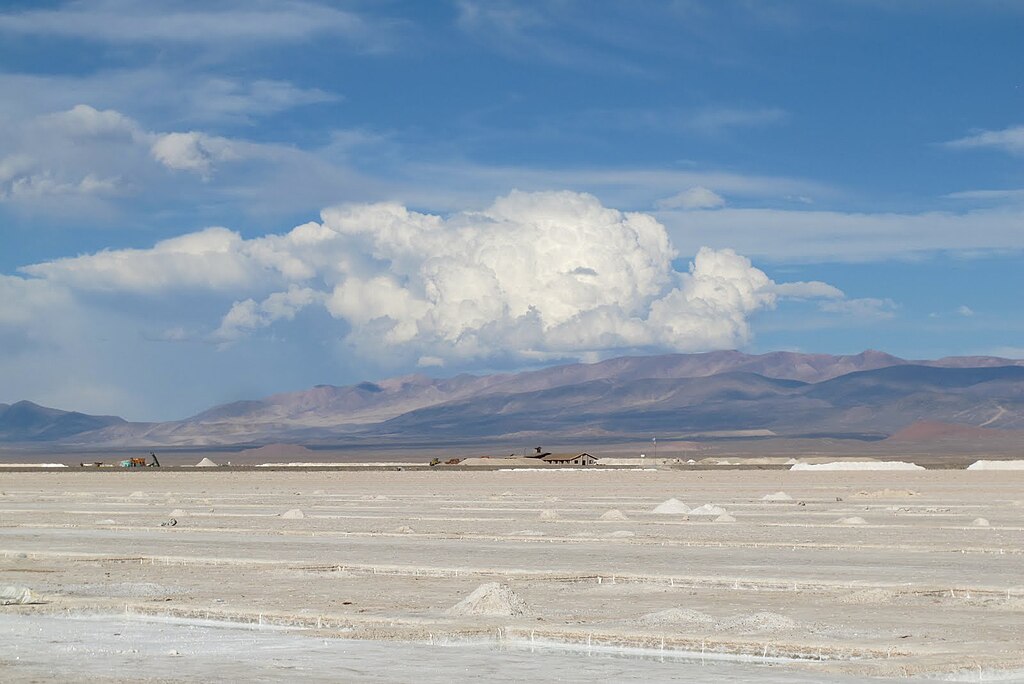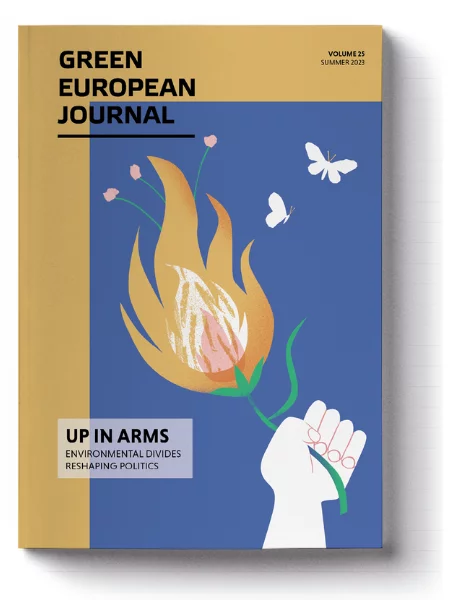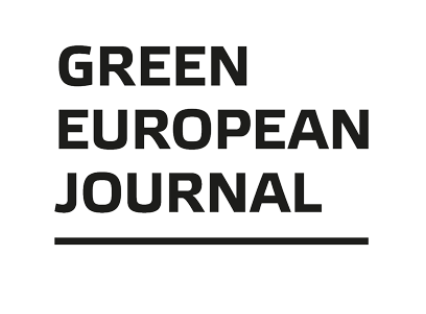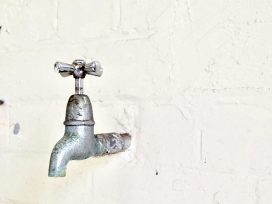Behind the green transition
The lithium reserves in northern Argentina are some of the largest in the world. Here lies the coveted ‘white gold’ that powers the batteries required for the EU energy transition. But the intensive extraction leaves behind domestic conflict and resource competition.
We are in northern Argentina, near the Bolivian border, at an altitude of over 3000 metres. The sun shines brightly on the vast, snow-white landscapes of the Salinas Grandes, the country’s largest salt flats. In summer, temperatures here soar to 45 degrees Celsius. The air is thin – it’s harder to breathe, and walking takes effort – and the light is different. Brighter, warmer, more immediate. It is bone dry, and the salt crunches beneath our feet.
We have driven a hundred kilometres without seeing a single oncoming vehicle – only vicuñas (a wild relative of the llama), jackals, and hawks. Passing through a landscape almost devoid of vegetation, the road was littered with stones, reminiscent of the Dakar Rally. It is here, in these arid Argentine highlands, that the world’s second-largest lithium reserve is located.
The white gold rush
Lithium is sometimes called white gold. ‘With its attractive silvery-white colour, lithium is the least dense of all metals. It is so light that it floats on water, and so soft that it can be cut with a knife. But the property that makes it such a coveted and strategic element today is its great capacity for energy storage,’ writes Spanish science journalist Héctor Rodríguez. Used in electric car batteries, wind turbines, solar panels, mobile phones, and computers, lithium is indispensable for the energy transition.
A World Bank report published in 2020 predicts that by 2050, graphite, cobalt, and lithium production could increase by as much as 500 per cent to meet the rising demand for minerals associated with the transition to renewable energy. The war in Ukraine is further speeding up the energy transition as countries aim to generate more green energy domestically, thus reducing their exposure to geopolitical tensions. As a result, renewable energy could become the main source of electricity worldwide as early as 2025. A resource rush in the Salinas Grandes, led by the Argentine government as well as Australian, Chinese, and Canadian mining companies, therefore seems inevitable.
The so-called Lithium Triangle, comprising the border region of Argentina, Chile, and Bolivia, accounts for more than 60 per cent of the world’s lithium reserves. Brine rich in the metal is pumped from reservoirs 200 metres beneath the salt flats and transported through pipelines to a series of large open-air basins, where most of the water slowly evaporates. The remaining brine is then pumped to a recovery facility, and the metal is extracted.
The region’s aridity favours particularly rapid evaporation, conferring a financial advantage on operations there. However, it also means that water resources are scarce. As the lithium extraction process is highly water intensive, with an estimated 400,000 to 2 million litres of water needed to extract one tonne of lithium, it is unsurprising that it is leading to the depletion of groundwater in the surrounding regions.

The Salinas Grandes, salt flats in Argentina. Image via Wikimedia Commons.
Water and drought, life and death
A 2020 projection estimated that lithium mining in Argentina would use up to 50 billion litres of water in 2022, equivalent to the annual consumption of a city with a population of 350,000. This is catastrophic for a region already experiencing severe drought linked to the increasingly tangible effects of climate change. Most residents depend on agriculture for their survival. If the groundwater runs dry, crops will fail, and there will be no food on the table.
According to social movement news portal El Ciudadano, farming communities in this drought-stricken corner of South America fear for their livelihoods. Gil Cruz, a weaver from Santa Cruz, testifies, ‘The day I run out of llamas, I don’t know what I’ll live on, what I’ll feed my children. If the water runs out, life will disappear. What will our cattle live on if there’s no water left? The mining companies think of today’s bread, but not tomorrow’s. We are worried about the future of our children and grandchildren.’
‘Aquí la Pacha se defiende’ is written in large letters on the walls of the villages that line the salt flats. This phrase, which means both ‘Here the Earth is defended’ and ‘Here the Earth defends itself’, gets to the crux of the matter: the fundamental clash between two worldviews. On the one hand, that of the indigenous communities of the salt flats in their struggle to protect their livelihoods, traditions, and ecosystem. On the other, that of the modern world in its desperate need to find an alternative to oil that will allow its system of production and consumption to go unchallenged.
Since the beginning, the exploration and exploitation of lithium have led to territorial conflicts with local indigenous communities. In the case of the Salinas Grandes, this concerns a population totalling 6000 people who depend on small-scale agriculture, salt mining, and tourism. But the problem extends much further, with protests also growing in the Atacama Desert, just across the Chilean border.
The salt flats as a sacrifice zone
In the Argentine region of Jujuy, locals have been resisting the continued expansion of mining projects for more than a decade. They organize regular inter-communal consultation meetings, raise awareness of the cause via social media, and create murals. Every year on 12 October – the day Columbus first set foot in the Caribbean, a day that for them marks the beginning of genocide – they organize a march for water and life.
‘Our ancestors cared for this land for centuries, now it is up to us. The rotation of crops, of pastures… These companies don’t understand that. They come, they clear the land, and leave again. But that’s not how it works: it’s about a delicate collaboration [with the planet Earth and water] so that there is enough for everyone,’ says Clemente Flores, a representative of the 33 communities resisting the advance of mining in the Salta and Jujuy regions. ‘We depend on the landscape for our agriculture, for cattle breeding. And tomorrow, what then? Moreover, the mines do not provide many jobs even though they claim otherwise.’
One of the major problems is the infringement of the right to free, prior, and informed consultation as recognized in the United Nations Declaration on the Rights of Indigenous Peoples – both by the government and by the companies themselves. ‘We are not against mining per se,’ Flores continues, ‘we just want our voice to be respected.’
The communities inhabiting the region have complained for years that the government approves mining projects without consulting them, despite the fact that these projects have a direct impact on their culture and way of life and take place on their ancestral land. They refer to the right to self-determination of indigenous communities, which should allow them to ‘freely determine their political status and freely pursue their economic, social and cultural development’. ‘If these rights are not at least respected, colonialism in all its facets remains in force,’ says anthropologist Gustavo Ontiveros, himself a member of the Omaguaca community in the region.
In spite of the protests, the colonization of indigenous territories and sacrifice of their traditions to ‘save the world’ appears to be inevitable. Are we doomed to repeat the history of past centuries? Will the salt flats and the life they support become zonas de sacrificio (‘sacrifice zones’) for the North American, European, and Asian energy transitions? Sociologist and activist Maristella Svampa and environmental lawyer Enrique Viale underline the importance of recognizing the role of historical ecological debt: the Global North’s centuries-long predation on the natural environments and human rights of the Global South. The high environmental costs still paid by the peoples of the Global South reflect the deep inequalities between continents.
Threatened local ecosystems
A large-scale 2021 study by Wetlands International confirms that lithium mining is associated with massive water loss and leads to freshwater salinization, posing a huge threat to fragile wetlands in Argentina, Bolivia, and Chile. These ecosystems in the heart of the Andes are not only of great value to the local economy; they also support unique ecosystems and represent an invaluable cultural heritage. Moreover, a group of scientists from the British Royal Society concluded in a 2022 study that the recent large-scale flamingo deaths in the region were effectively due to a lack of water. The bird, emblematic of the region, lives in large flocks in the salt lakes. A further increase in lithium mining and an associated reduction in surface water could have dramatic consequences for the population.
The debate around lithium extraction is a microcosm of the broader cultural-philosophical crisis faced by contemporary industrialized societies. We continue to view the environment as the backdrop to human activity, thus placing ourselves outside nature. This clashes heavily with the worldview of communities seeking to preserve their environments and traditions. The example of lithium also highlights the importance of climate justice: it is often the most vulnerable groups in society that are hit hardest by the effects of climate change. The case of the salt flats, however, seems to present us with a ‘Sophie’s choice’ between the consequences of climate change and the harm done by extracting the resources necessary to fight it.
There is no doubt that the energy transition is a necessary step in the move to a post-fossil society. The continued rollout of renewable energy is crucial to keep our planet liveable. The only question is how to make it happen in an equitable way, involving all parties. There is much talk in progressive European circles about a just transition, but this is still too often limited to workers’ rights within the borders of our own continent. If we want to combat global inequality, we need to broaden our perspective and apply these principles of justice and compensation to the entire supply chain.
In this context, the rollout of EU due diligence legislation is a hopeful step forward. Its aim is to promote sustainable and responsible corporate behaviour and embed human rights and environmental considerations in companies’ operations and governance. The new rules will ensure that companies address the negative impacts of their actions, including in value chains within and outside Europe. This is clearly a positive development, but it is not enough. We need global due diligence legislation that goes beyond the European Union to include the rest of the world.
Due diligence and the ethics of care
The due diligence principle aligns with what we call a ‘care ethic’ in Dare to Care: Ecofeminism as a source of inspiration. Such an ethic assumes that we, as human beings, are embedded in numerous natural and social relationships and dependencies that must be taken into account when considering a particular course of action. Science and technology professor and feminist thinker Maria Puig de la Bellacasa translates this insight as concern for ‘more-than-human worlds’. She shows that we cannot separate human and non-human care relationships. Those who care for nature also care for humans. There is only one health, and planet and people are inseparable. This new position calls for us to carefully decentralize ourselves – not always considering humans as the centre of everything – while at the same time staying very close to the fortunes of people in their concrete and sometimes precarious life situations. It demands that we change some of our fundamental conceptions. It involves re-grounding ourselves with an open gaze and taking responsibility for the world that sustains us.
In their book El colapso ecológico ya llegó, Maristella Svampa and Enrique Viale stress the importance of decentralizing energy systems. According to them, the lithium issue inhabits both the old paradigm of predatory extractivism – linked to unsustainable water consumption, the destruction of biodiversity, and disrespect for human rights – and the new paradigm of a post-fossil society and renewable energy. The energy transition should not and cannot be limited to a mere switch to renewable energy sources that allows our current mode of consumption to go unchallenged. Decarbonization must lead to a profound change in our production, distribution, and consumption systems. Above all, it must change our social conduct – towards each other and towards our environment. It must restore and strengthen our interdependence with nature. This can only be achieved by adopting a perspective that considers the rights of local populations and nature as well as environmental costs. Besides recycling and developing a circular economy, we need to develop energy systems that operate by decentralisation and devolution to guarantee equal access to and distribution of energy. Energy cooperatives are one means to ensure civil society participation in energy governance and production.
The case of the Argentine salt flats demonstrates that the way we generate energy, whether fossil or green, has a concrete impact on the lives of people worldwide. It is imperative that we continue to work towards an energy system that emphasizes social and environmental responsibility along all parts of the supply chain. This is not an individual, but a collective, political task.
Published 29 September 2023
Original in English
First published by Green European Journal / Eurozine
Contributed by Green European Journal © Marie-Monique Franssen / Green European Journal / Eurozine
PDF/PRINTIn collaboration with
Newsletter
Subscribe to know what’s worth thinking about.
Related Articles

Nine years ago, a slim majority of UK voters chose to leave the European Union – without a clear plan or the tools to make it happen. Five years after the de facto departure, relations are slowly being repaired, driven in part by the increasingly unpredictable political climate in the United States.

Since the collapse of Novi Sad’s train station in November, student-led protests have erupted across Serbia, inspiring a nationwide movement against corruption.






